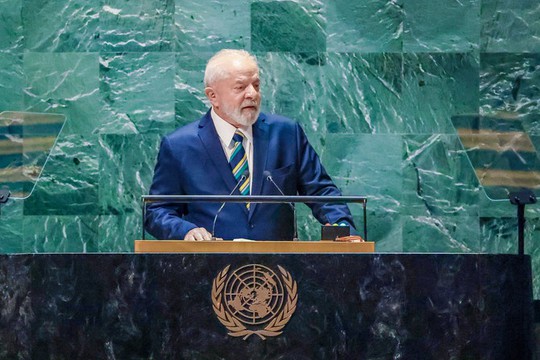Brazil President Lula calls the UN General Assembly
In his speech at 78th UN General Assembly Brazil President Luiz Inacio Lula da Silva called for equitable efforts to tackle climate change and said his country is committed to clean energy. He also highlighted the importance of a global culture of peace and voiced concerns about existing conflicts, including the Palestinian issue, and emerging threats
During his meaningful speech at the 78th UN General Assembly in New York on Tuesday, Lula da Silva highlighted a number of global issues he described as critical. These included climate change, the global wealth gap, gender equality, freedom of the press, the urgent need for sustainable development, and the importance of international cooperation and collective action to address these and other pressing global concerns.
Lula also highlighted the erosion of multilateralism, and the distorted representation of nations in international institutions, and market-driven inequalities, as he emphasized the need for a new model for economic governance.
He said this was one of the reasons for the emergence of BRICS, a grouping of emerging economies that currently includes Brazil, Russia, India, China and South Africa. The members recently revealed plans to expand the group, and have invited Saudi Arabia, the UAE, Iran, Ethiopia, Egypt and Argentina to join.
“The BRICS was the result of this paralysis and constitutes a strategic platform to promote cooperation between emerging countries,” Lula said.
“The recent expansion of the group at the Johannesburg Summit strengthens the fight for an order which accommodates the economic, geographic and political plurality of the 21st century. The lack of equality and imbalances in the IMF’s and the World Bank’s management are unacceptable… Amid this inertia there emerged BRICS, which is a strategic platform for promoting cooperation between developing countries,” he said.
“We are a force that works toward fairer global trade in the context of a serious crisis in multilateralism. Rich countries’ protectionism has gained strength and the World Trade Organization remains paralyzed, especially its dispute-settlement system. Nobody remembers the Doha Development Round anymore.”
The Doha Development Round was a WTO negotiation initiative that aimed to reduce trade barriers around the world, with a particular focus on the priorities of less-developed countries. Progress stalled in 2008, and the process now is effectively considered dead.
He underscored his enduring faith in humanity’s ultimate capacity to overcome the challenges it faces, such as the climate crisis, the persistence of hunger that affects 735 million people worldwide, and the growing global gap between rich and poor.
Climate change took center stage in his speech, as Lula advocated for equitable climate action and emphasized Brazil’s commitment to clean energy, including green hydrogen. He said that 87 percent of Brazil’s electrical power now comes from clean and renewable sources.
“It is the vulnerable populations in the Global South who are most affected by the loss and damage caused by climate change,” he said.
“The richest 10 percent of the world’s population is responsible for almost half of all carbon released into the atmosphere. We, developing countries, do not want to repeat this model.”
Lula criticized the unequal distribution of financial and technological resources for climate action and highlighted the fact that an international promise made in 2009 to provide $100 billion a year to help developing countries finance climate action remains unfulfilled.
“Without mobilizing financial and technological resources, there is no way to implement what we decided in the Paris Agreement and the Global Biodiversity Framework,” he said.
“The promise to allocate $100 billion annually to developing countries remains just that, a promise. Today, this amount would be insufficient for a demand that already reaches trillions of dollars.”
Brazil will take over the presidency of the G20 from India later this year.
“Upon taking over as the chair of the G20 in December, we will spare no effort to place the fight against inequalities, in all its dimensions, at the core of the international agenda,” Lula said.
read more in our Telegram-channel https://t.me/The_International_Affairs

 11:03 21.09.2023 •
11:03 21.09.2023 •























